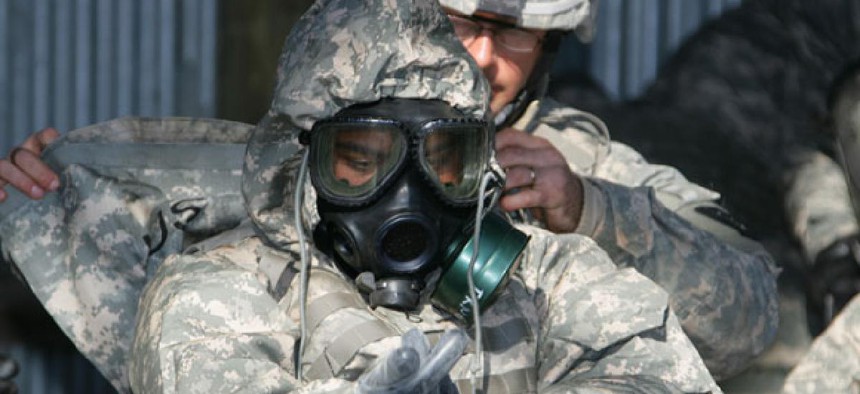Army Awards $156.6 Million Anti-Nerve Gas Agent Contract

United States Army
‘Bioscavenger’ agent won’t be fielded for six years.
This story has been updated with additional details and background.
The Army has awarded a $156.6 million contract to the DynPort Vaccine division of Computer Sciences Corp for development of an anti-nerve gas agent that protects against a wide range of nerve gases for up to 60 days. The agent will not be ready to use for at least six years.
The award comes on the heels of news that both the Syrian Army and rebels have used nerve gas and a “red line” warning by President Obama against the use of nerve gas by the Syrian government. Last year the Pentagon projected it could take as many as 75,000 troops to seize and control Syria’s stockpile of chemical weapons.
DynPort started work on the anti-nerve gas agent in 2007 based on human butyrylcholinesterase, a blood or plasma protein that binds and inactivates nerve agents, under a clinical trial contract with Defense Medical Identification and Treatment Systems’ Joint Product Management Office.
The new contract, awarded on Friday, calls for DynPort to develop, test and obtain Food and Drug Administration approval for what MITS calls the “Bioscavenger” nerve gas prophylaxis. This name derives from the fact that butyrylcholinesterase acts as a scavenger by binding nerve agent in the blood stream before it can exert effects in the nervous system.
Maj. Luis Alvarez. MITS assistant told an industry briefing in January 2011 that Bioscavenger is the “first ever nerve agent prophylactc that prevents incapacitation and death from exposure to a broad spectrum of nerve agent[s].” DynPort said preclinical research indicated butyrylcholinesterase inhibits toxicity in nerve agents, including Sarin, Soman and VX.
Defense currently uses atropine as an anti-nerve gas agent, but its use can lead to temporary incapacitation. Alvarez said Bioscavenger will transform how Defense protects troops against nerve gases.
The Centers for Disease Control and Prevention classifies nerve agents as the most toxic and rapidly acting of the known chemical warfare agents, which are similar to but much more potent than than organophosphate pesticides.
Alvarez said Bioscavenger provides “chemical immunity” against all organophosphate nerve agents at lethal dose ranges and helps reduce casualties from a nerve gas attack.
In an industry presentation in October 2011, Alvarez said MITS wanted Bioscavenger to initally provide protection against nerve agents for ten days with a goal of 60 days after treatment. The antidote has already undergone animal tests, but Alvarez said it will also need to be tested on “hundreds to thousands” of human volunteers before it can win FDA approval.
NEXT STORY: Telework Honor Roll






